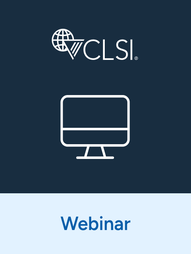
CLSI MM03 Webinar
Overview: Molecular Diagnostic Methods for Infectious Diseases Webinar
Free On-Demand Webinar: Understanding CLSI MM03
Gain valuable insights into CLSI MM03 with this informative webinar. Learn how to effectively implement molecular diagnostic methods for infectious diseases and ensure regulatory compliance.
What You’ll Learn:
- The purpose and scope of MM03.
- The key differences between amplified and nonamplified nucleic acid methods.
- Guidelines for selecting and qualifying nucleic acid sequences.
- How to establish and evaluate test performance characteristics, inhibitors, and interfering substances.
- Strategies for controlling false-positive reactions.
- Best practices for interpreting and reporting results.
- How to develop and maintain a Quality Assurance (QA) program.
- Steps to ensure compliance with regulatory requirements.
- Expert recommendations for manufacturers and clinical laboratories.
This webinar was developed by CLSI staff in June 2020.
This webinar is included as a free CLSI membership benefit.
{{FormatPrice(currentPrice)}}
Free
{{FormatPrice(nonMemberPrice)}} List PriceThis free webinar provides an overview of the information in CLSI MM03, including:
The purpose of MM03
The difference between amplified and nonamplified nucleic acid methods
How to select and qualify nucleic acid sequences
How to establish and evaluate test performance characteristics, inhibitors, and interfering substances
How to control false-positive reactions
How to interpret and report results
How to establish a Quality Assurance (QA) program
How to ensure regulatory requirements are met
Recommendations for manufacturers and clinical laboratories
This free webinar provides an overview of the information in CLSI MM03, including:
The purpose of MM03
The difference between amplified and nonamplified nucleic acid methods
How to select and qualify nucleic acid sequences
How to establish and evaluate test performance characteristics, inhibitors, and interfering substances
How to control false-positive reactions
How to interpret and report results
How to establish a Quality Assurance (QA) program
How to ensure regulatory requirements are met
Recommendations for manufacturers and clinical laboratories